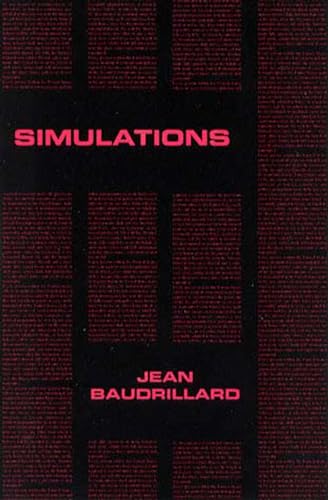Articoli correlati a Simulations

Sinossi
Baudrillard's bewildering thesis, a bold extrapolation on Ferdinand de Saussure's general theory of general linguistics, is in fact a clinical vision of contemporary consumer societies where signs don't refer anymore to anything except themselves. They all are generated by the matrix.
Simulations never existed as a book before it was "translated" into English. Actually it came from two different bookCovers written at different times by Jean Baudrillard. The first part of Simulations, and most provocative because it made a fiction of theory, was "The Procession of Simulacra." It had first been published in Simulacre et Simulations (1981). The second part, written much earlier and in a more academic mode, came from L'Echange Symbolique et la Mort (1977). It was a half-earnest, half-parodical attempt to "historicize" his own conceit by providing it with some kind of genealogy of the three orders of appearance: the Counterfeit attached to the classical period; Production for the industrial era; and Simulation, controlled by the code. It was Baudrillard's version of Foucault's Order of Things and his ironical commentary of the history of truth. The book opens on a quote from Ecclesiastes asserting flatly that "the simulacrum is true." It was certainly true in Baudrillard's book, but otherwise apocryphal.One of the most influential essays of the 20th century, Simulations was put together in 1983 in order to be published as the first little black book of Semiotext(e)'s new Foreign Agents Series. Baudrillard's bewildering thesis, a bold extrapolation on Ferdinand de Saussure's general theory of general linguistics, was in fact a clinical vision of contemporary consumer societies where signs don't refer anymore to anything except themselves. They all are generated by the matrix.In effect Baudrillard's essay (it quickly became a must to read both in the art world and in academe) was upholding the only reality there was in a world that keeps hiding the fact that it has none. Simulacrum is its own pure simulacrum and the simulacrum is true. In his celebrated analysis of Disneyland, Baudrillard demonstrates that its childish imaginary is neither true nor false, it is there to make us believe that the rest of America is real, when in fact America is a Disneyland. It is of the order of the hyper-real and of simulation. Few people at the time realized that Baudrillard's simulacrum itself wasn't a thing, but a "deterrence machine," just like Disneyland, meant to reveal the fact that the real is no longer real and illusion no longer possible. But the more impossible the illusion of reality becomes, the more impossible it is to separate true from false and the real from its artificial resurrection, the more panic-stricken the production of the real is.
Le informazioni nella sezione "Riassunto" possono far riferimento a edizioni diverse di questo titolo.
Informazioni sull?autore
Jean Baudrillard (1929–2007) was a philosopher, sociologist, cultural critic, and theorist of postmodernity who challenged all existing theories of contemporary society with humor and precision. An outsider in the French intellectual establishment, he was internationally renowned as a twenty-first century visionary, reporter, and provocateur.
Le informazioni nella sezione "Su questo libro" possono far riferimento a edizioni diverse di questo titolo.
GRATIS per la spedizione in U.S.A.
Destinazione, tempi e costiCompra nuovo
Visualizza questo articoloGRATIS per la spedizione in U.S.A.
Destinazione, tempi e costiRisultati della ricerca per Simulations
Simulations (Foreign Agents Series)
Da: Goodwill of Colorado, COLORADO SPRINGS, CO, U.S.A.
Condizione: good. All pages and cover are intact. Dust jacket included if applicable, though it may be missing on hardcover editions. Spine and cover may show minor signs of wear including scuff marks, curls or bends to corners as well as cosmetic blemishes including stickers. Pages may contain limited notes or highlighting. "From the library of" labels may be present. Shrink wrap, dust covers, or boxed set packaging may be missing. Bundled media e.g., CDs, DVDs, access codes may not be included. Codice articolo COLV.0936756020.G
Quantità: 1 disponibili
Simulations (Foreign Agents Series)
Da: Books From California, Simi Valley, CA, U.S.A.
paperback. Condizione: Fine. Codice articolo mon0003793182
Quantità: Più di 20 disponibili
Simulations (Foreign Agents) Format: Paperback
Da: INDOO, Avenel, NJ, U.S.A.
Condizione: New. Codice articolo 9780936756028
Quantità: Più di 20 disponibili
Simulations
Da: Rarewaves USA, OSWEGO, IL, U.S.A.
Paperback. Condizione: New. Codice articolo LU-9780936756028
Quantità: Più di 20 disponibili
Simulations (Foreign Agents) Format: Paperback
Da: INDOO, Avenel, NJ, U.S.A.
Condizione: As New. Unread copy in mint condition. Codice articolo RH9780936756028
Quantità: Più di 20 disponibili
Simulations (Foreign Agents Series)
Da: Goodwill of Silicon Valley, SAN JOSE, CA, U.S.A.
Condizione: acceptable. Supports Goodwill of Silicon Valley job training programs. The cover and pages are in Acceptable condition! Any other included accessories are also in Acceptable condition showing use. Use can include some highlighting and writing, page and cover creases as well as other types visible wear such as cover tears discoloration, staining, marks, scuffs, etc. All pages intact. Codice articolo GWSVV.0936756020.A
Quantità: 1 disponibili
Simulations
Da: Eagle Eye Books, Decatur, GA, U.S.A.
Paper Back. Condizione: New. Codice articolo 671316
Quantità: 2 disponibili
Simulations
Da: Books Puddle, New York, NY, U.S.A.
Condizione: New. pp. [x] + 159 + [v]. Codice articolo 26534071
Quantità: 3 disponibili
Simulations (Foreign Agents)
Da: BookHolders, Towson, MD, U.S.A.
Condizione: Good. [ No Hassle 30 Day Returns ][ Ships Daily ] [ Underlining/Highlighting: NONE ] [ Writing: NONE ] [ Edition: First ] Publisher: Semiotext(e) Pub Date: 1/1/1983 Binding: Paperback Pages: 169 First edition. Codice articolo 6880837
Quantità: 1 disponibili
Simulations
Da: Majestic Books, Hounslow, Regno Unito
Condizione: New. pp. [x] + 159 + [v]. Codice articolo 8362472
Quantità: 1 disponibili

